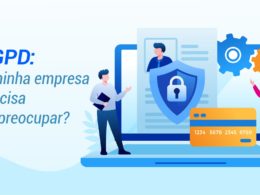Information security has become a priority for organizations and accounting offices , especially with the implementation of the General Data Protection Law.
Therefore, the law redefined the collection, storage and processing of data, in addition to establishing strict guidelines for the protection and confidentiality of information, essential for accounting offices that deal with sensitive data from clients and employees.
The Law came into force in 2021, requiring adaptations. As a result, more and more tools are being used to protect this data, allowing companies to ensure the availability and integrity of information. Furthermore, the growth of cyber attacks has driven the development of security solutions.
After all, how does all this impact accounting offices? To help you understand more about the subject, we have prepared this material with everything you need to know about LGPD in accounting offices and how to increase information security in an efficient and practical way.
Information security in accounting offices: what is it?
Information security is crucial in accounting offices , ensuring the protection of personal and financial data stored and processed . This allows users to have full assurance that their information is protected.
When we refer to information security in accounting offices we need to understand that there are three essential pillars:
- Integrity: the guarantee that information is complete, complete and accurate without unauthorized changes being made.
- Confidentiality: this is a pillar that refers to ensuring that only authorized users are able to access information, preventing it from being viewed inappropriately.
- Availability: it is the guarantee that information is accessible whenever necessary, without interruptions to lives.
Therefore, in accounting offices, information security is crucial to protect the valuable data of customers and employees . The digitalization of accounting processes, as well as the use of ERP systems and the adoption of cloud technology made it necessary to overcome several security challenges.
Therefore, accounting offices needed to adopt rigorous cybersecurity solutions and measures, such as the implementation of Firewalls, monitoring mechanisms and access filters, to prevent information leakage and unauthorized access by unauthorized users. Furthermore, it is essential to implement an internet usage policy that makes employees aware of the importance of a stronger cybersecurity culture.
However, information security in accounting offices goes beyond the use of technologies and policies: a cultural and behavioral change among employees is crucial. This includes awareness, adoption of safe practices, regular training and preparation to deal with cybersecurity incidents.
Information system protection in accounting
As we mentioned earlier, protecting information systems in accounting involves more than implementing robust policies and practices to ensure data privacy. In other words, the adoption of comprehensive solutions is also essential. Thus, like the LGPD , accounting offices need to adopt specific measures to protect the sensitive data that is collected and stored, such as data encryption, access control, training and qualification, among others.
Therefore, the creation of an Information Security Committee became essential. In other words, the committee is responsible for developing and monitoring the office's data protection policies , ensuring compliance with the regulations that are applicable to this sector.
Information Security Committee
The Information Security Steering Committee (CGSI) is essential for defining guidelines for the treatment of personal information in a company. The committee, made up of key representatives, manages and directs information security activities to protect the confidentiality, integrity and availability of accounting office data .
The responsibilities of the Information Security Management Committee are:
- Definition of Security Policies;
- Implementation of Security Measures;
- Risk assessment;
- Security Incident Management;
- Training and Awareness;
- Monitoring and Auditing;
- Compliance with Regulations;
- Reports and Communication.
Therefore, assignments are fundamental to ensuring the security and protection of data, minimizing risks and increasing trust. Therefore , the creation of an Information Security Committee is essential to carry out the supervision and implementation of cybersecurity measures within accounting offices. Furthermore, the committee is responsible for developing security policies, assessing risks and promoting employee training and awareness.
Therefore, the implementation of CGSI makes the accounting firm demonstrate commitment to protecting the privacy of the information that is stored , ensuring a differentiated positioning in the market.
LGPD in accounting offices
Although it was developed for application in companies across all sectors, the LGPD plays an even more important role within accounting offices. So, by establishing guidelines for the processing of sensitive data within companies, the objective of this legislation is to protect people's individuality and privacy.
In this sense, guidelines for collecting, storing, processing and sharing information are fundamental in the accounting sector. Therefore, to comply with the LGPD, it is necessary to implement internal mechanisms and control systems. Furthermore, it is necessary to generate documentary evidence for internal and external audits.
The accounting office must follow a data protection policy, ensuring that all LGPD principles are satisfied before processing any information. Therefore, it is essential to obtain and prove the customer's consent to retain, record and store their personal data.
The office is responsible for implementing technical and organizational measures to protect data against unauthorized access and misuse of this information. It is crucial to ensure that data subjects have control over their personal information , in accordance with current legislation.
What is personal data for LGPD?
Therefore, for the LGPD, personal data is considered to be all information that is related to an identified or identifiable natural person. In other words, it can be personal data ranging from basic information such as address and name, to more confidential data, such as financial information.
This definition helps to understand what personal data is and ensure that companies can collect, store and process this information more securely.
Thus, within the specifications of the General Data Protection Law , there are also special categories of personal data, such as biometric and genetic data. This type of information requires additional security measures due to the great potential for damage that leaking this data can cause.
LGPD in accounting
As we can see throughout this material, the LGPD came as a way to protect information and also has a significant impact on companies. When it comes to the accounting sector, companies have an additional obligation to implement strict protection measures given the sensitivity of the information that is stored and collected.
In this sense, legislation is essential for these businesses, mainly due to the consequences that a lack of adequacy can bring. According to the National Data Protection Authority, fines imposed for violations can reach up to 2% of the company's annual revenue, limited to R$50 million per violation.
The penalties aim to ensure that companies respect individuals' privacy rights and adopt solutions to improve information security. In addition to fines, there are other types of penalties that can be applied by the LGPD. Data subjects can request compensation for moral or material damages caused by carelessness or security breaches, increasing companies' liability.
What changed in accounting offices with the LGPD?
All of these changes have had a major impact on accounting offices . With its implementation, it was necessary to carry out a complete review of all privacy and information security policies that were applied by the office, causing a real transformation in the way tasks were carried out.
Companies that deal with personal data needed to appoint a Data Protection Officer (DPO), a position that helps the company adapt its processes to structure a compliance program focused on greater security of the information under its custody. Ensuring compliance with LGPD and also to implement a culture of data protection within the company.
Transparency and responsibility are two basic concepts that should guide the performance of a Data Protection Officer in the professional environment. Because he is the person who understands the most about the dangers and safety mechanisms, he ends up becoming a reference on the subject within the company.
It is crucial to establish an Information Security Committee to create and implement policies, conduct audits, and provide cybersecurity training This ensures compliance with the General Data Protection Law and reinforces the reputation of accounting offices with clients.
The role of security policy in data protection
The use of technologies to carry out daily tasks has become constant among most companies, especially in relation to information systems. Due to the sensitivity of the information stored by an accounting office, protecting the information system requires additional care.
The policy implemented to protect personal data must take into account a process to mitigate risks and protect the privacy of this information , making it essential to adopt solutions such as firewalls , data encryption, monitoring systems and much more.
It is essential to establish clear data retention policies to ensure system security. This involves defining the period for which the information will be kept and establishing how to safely dispose of it when it is no longer needed. Therefore, it is essential that the accounting office regularly reviews its data protection policies to keep information secure.
Therefore, to support accounting offices in protecting sensitive data and ensuring compliance with the LGPD, we have developed a “Sensitive Data Protection Policy in compliance with the LGPD” . This material aims to increase digital security in the workplace and inform customers and employees about the measures adopted by the office. Click here and download the template for free!
LGPD and ISO 27701:2019 in data protection
ISO 27701:2019 is an extension of the ISO 27001 and ISO 27002 standards, focusing on information privacy management. It enables the development of a Privacy Information Management System (PIMS), aimed at helping organizations manage personal information responsibly and also comply with privacy regulations, such as the General Data Protection Regulation (GDPR) and General Data Protection Law (LGPD).
This standard is essential for organizations that deal with large volumes of personal data, contributing to reducing the risks of leaks and incorrect use of this information. By adopting the practices and strategies recommended by this standard, businesses can improve their data governance and protect individuals' privacy.
What many people don't know is that LGPD and ISO 27701:2019 are complementary in the process of protecting personal data today. With regard to accounting offices, while on the one hand the LGPD provides guidelines for the appropriate treatment of information, ISO 27701 provides a framework for implementing a privacy management system.
Developed to expand the requirements brought by ISO 27001 , ISO 27.701 brings specific additional controls to increase the protection of personal information, helping accounting offices to implement robust practices and controls to not only offer more security, but also meet the requirements brought by LGPD.
Protection of sensitive data in accounting
To protect sensitive data in accounting in accordance with current legal requirements, not only appropriate security tools are needed, but also additional measures to strengthen information security. The leakage of sensitive data can result in great harm to data subjects, including financial fraud and misuse of identity.
The rise of cyberattacks has highlighted that data of many types can be used to cause harm, including financial information, biometrics, health records and other personal data. In 2023, a Trend Micro indicated the blocking of 161 billion cyber threats. It is the responsibility of accounting offices to implement solutions to control, monitor access and authenticate users, preventing this information from falling into the wrong hands.
Tools to ensure information security in accounting offices
Although cyber attacks have shown considerable growth, it is possible to count on the help of technology to ensure greater information security. Among the main features, we can mention:
big data
Resources such as Big Data , for example, allow managers to obtain advanced analyzes of a large volume of information, helping to identify anomalies and patterns that indicate irregular activities.
Big Data also enables several opportunities for data protection, including analysis for fraud detection, personalization of services, improved decision making and much more. With the help of this technology, it is possible to more efficiently evaluate the behavior and use of information within your accounting office.
Data Protection Policy in compliance with LGPD for accounting offices
It is crucial for accounting offices to implement a data protection policy in compliance with the LGPD, due to the constant handling of sensitive data. This policy should begin by identifying and classifying the data collected to determine the level of protection required.
This entire process is essential for the implementation of consolidated and transparent processes that define the purpose and duration of data storage. Furthermore, the data protection policy must include regular training for employees on good security practices, essential to ensure compliance and information security.
Cloud Storage
At the same time, cloud storage also allows the accounting office to have more flexibility and scalability during day-to-day tasks , ensuring controlled and secure access to essential information anywhere.
Cloud technology offers several essential benefits such as global accessibility, enhanced security through encryption, automatic synchronization, automatic backup, and much more. Therefore, cloud solutions have become indispensable for companies, enabling the storage of large volumes of information with a lower risk of loss.
Data governance
To increase efficiency and security, it is recommended to implement data governance in the accounting office, establishing formal processes to manage and protect confidential and sensitive data. This may involve data retention policies and procedures for responding to cyber incidents, helping to reduce damage and prevent additional problems.
In a reality driven by large amounts of data in real time, data governance represents an indispensable aspect . Thus, it enables more informed decisions and increased protection against risks and legal compliance, especially with the LGPD.
firewall
The Firewall is one of the oldest security features and also one of the most used for data protection. Functioning as an additional barrier between your network and the outside world, the firewall acts as an input and output analysis filter, allowing unauthorized access to be blocked.
When it comes to protecting information, Firewall is a tool aimed at protecting against attacks and data breaches, controlling network traffic and increasing the security of connected devices. Furthermore, its implementation also aims to comply with legal security requirements, such as those established by the General Data Protection Law.
The future of information security in accounting offices
Due to the changes we have experienced in recent years, the future of information security in accounting offices is constantly evolving. The growing demand for protecting sensitive data and maintaining the confidentiality of personal information requires companies to constantly adapt to these transformations.
According to IBM's 2023 Data Breach Cost Report , the global average costs of a data breach in 2023 were approximately $4.45 million, an increase of 15% over the past three years.
In this context, it is important to highlight the increase in the use of Artificial Intelligence and automation, whose incorrect implementation can compromise data confidentiality. Therefore, there is a growing need for strict regulations to protect privacy.
Therefore, it is crucial that companies invest in education and continuous training so that their employees are prepared to deal with these threats. Additionally, it is important to adopt a proactive stance against cyber attacks.
Trends in information security
Technological advances have meant that the strategies and information security of accounting offices are constantly optimizing. Therefore, it is crucial to consider popular features in the industry to develop solutions that keep data protected in the face of these new technologies.
Therefore, the growing adoption of artificial intelligence , cloud technology and machine learning is improving cyber defense strategies, making them more efficient.
When it comes to financial data, Blockchain can increase information integrity and develop adaptive solutions for accounting offices. Therefore, the future of information security in accounting requires a multifaceted approach, combining advanced resources and technologies to ensure regulatory compliance and customer security.
Evolution of standards and regulations
In recent years, a number of standards and regulations have been developed in response to the growing need for more secure solutions and approaches to data protection. The LGPD exemplifies how legislation imposes strict rules for data protection, holding companies responsible for implementing efficient controls to ensure compliance.
ISO 27 1701 also has a major impact on information security , followed by the development of national cybersecurity policy.
These factors demonstrate the growing concern about data protection and the effort of legislation to increase this protection based on consolidated strategies.
The importance of ongoing education and training
In addition to using efficient technologies to protect confidential information, it is crucial that the company implements continuous education and training for its employees. These initiatives will foster a culture of cybersecurity and help prevent significant damage to the organization.
Therefore, these training programs must include cybersecurity best practices, regulatory compliance, and preparedness to mitigate vulnerability and contain damage. Changing organizational culture is crucial for protecting data in accounting offices, improving cybersecurity. Strengthening defenses involves more than adopting modern resources; It requires responsibility and a complete paradigm shift.
Finally, the importance of implementing a Data Protection Policy in accounting offices is evident. Recent changes in legislation have required companies to adopt more efficient resources and strategies to ensure compliance and increase process reliability.










